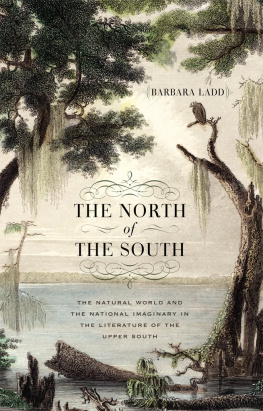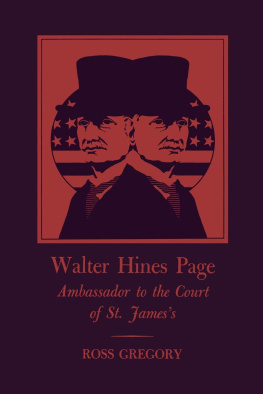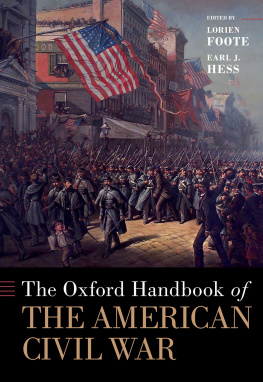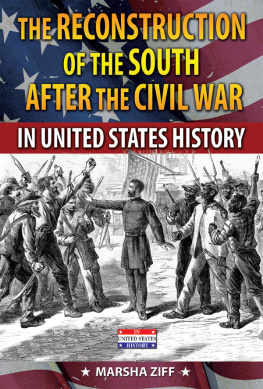ACKNOWLEDGMENTS
For me as a biographer, Walter Hines Page has proved unfailingly good company during nearly eight years of research and writing. He likewise introduced and brought me into contact with many people who proved equally good company and rendered my work much easier and more enjoyable than it would otherwise have been. Institutions, too, aided me by providing released time and financial support that facilitated my tasks. A fellowship from the National Endowment for the Humanities allowed me to pursue research full time during 196970. A grant from the Wisconsin Alumni Research Foundation, through the University of Wisconsin Graduate School, permitted me to spend a semester in 1972 entirely on research. Another grant from the Spencer Foundation, through the University of Wisconsin School of Education, enabled me to spend the summer of 1973 in uninterrupted work on Page. Final revisions and editing were done while I was spending a thoroughly enjoyable and highly profitable semester at the Institute for Research in the Humanities, University of Wisconsin. Grants from Wellesley College, the American Philosophical Society, the University of Wisconsin Graduate School, and the Spencer Foundation also enabled me to do extended traveling and photocopying in this country and Britain. The Department of History of the University of Wisconsin supplied both a stimulating environment for research and writing and an excellent secretarial staff, particularly Cecile Henneman, Helen Hull, Ruth Koontz, and Margaret Moore. To these people and institutions, I wish to extend my heartiest thanks.
Librarians and archivists played invaluable parts in my research, too. The Houghton Library at Harvard University, which houses the Page papers, provided a second home for me during many months of work. Special thanks must go to Carolyn Jake-man and Marte Shaw for innumerable kindnesses and courtesies. The staffs of the Wellesley College Library, especially Marion Kanaly, and the State Historical Society of Wisconsin repeatedly demonstrated resourcefulness and indefatigability in finding and obtaining materials for me. The staff of the Walter Hines Page Library of Randolph-Macon College, particularly Flavia Reed Owen and Cecil A. Reid, Jr., likewise furnished great help in unearthing and providing materials. Many other libraries in Britain and the United States similarly aided my research, as did the National Archives and the Public Record Office.
More than most biographers and historians, I owe a profound debt to private individuals who retain the papers of members of their families. My greatest debt of this kind or of any kind in my research is to Martha and Robert Rusnak of Elmhurst, Illinois, who hold the papers of her grandfather, Burton J. Hen-drick. On their own initiative, the Rusnaks informed me of the existence of these papers, which were almost indispensable to the biography, and then allowed me to copy whatever I wished. As if that were not enough, they fed and entertained me and became my good friends. This acknowledgment of my warmest thanks is small recompense for the Rusnaks contribution to this biography.
In the same vein, I wish to thank Lady Elizabeth Mary Arthur of London and Mr. Richard Bassett of Milton, Massachusetts. Lady Arthur generously lent me the private papers of her father, Sir Cecil Spring Rice, which were then in her possession, and she introduced me to other people who facilitated my research in England. She and her husband, the late Sir Raynor Arthur, also went far out of their way many times to do nice things for my whole family. They added much more than they know to the pleasure of our stay in England. Mr. Bassett allowed me to examine and copy from the papers of his father, John Spencer Bassett, and he and Mrs. Bassett extended me their warm hospitality.
Many people have been helpful in furnishing information about Page through correspondence and interviews. These include Lady Elizabeth Arthur, Richard Bassett, Jonathan Daniels, Margaret Digby, John H. Finley, Sir Ralph Hawtrey, Mrs. Richard Lovering, Broadus Mitchell, the late Raymond Moley, the late Thad S. Page, and Lady Percy of Newcastle. Fellow scholars who have likewise come to my aid on many occasions with advice and leads on sources and interpretations include Robert Bannister, Sally Cross, Carl Degler, David Herbert Donald, Robert H. Elias, Martin Gilbert, Noel Griesy, Cameron Hazelhurst, the late Richard Hofstadter, Robert A. Hohner, Sterling Kernek, Arthur S. Link, Peter Lyon, George W. Pierson, Keith Robbins, Blair Rouse, Morton P. Sosna, Zara S. Steiner, A. J. P. Taylor, George B. Tindall, Franklin Trenaby Walker, Samuel F. Wells, Jr., and Sherrill Brown Wells. Three medical friends, Dr. Edward Larkin, Dr. David Greenblatt, and Dr. William Craig, offered opinions on matters regarding Pages health and cause of death. I wish to thank all of these people for supplying information and perspectives that I could not otherwise have gotten.
Six historians and writers have aided me still more by reading parts or all of the manuscript of this biography, giving the kinds of suggestions and criticisms that are deserved by better efforts. Jonathan Daniels drew upon his intimate acquaintance with North Carolina and his father, Josephus Daniels, in reading . Two other distinguished colleagues, Paul K. Conkin and Paul W. Glad, took many hours away from busy schedules to read the entire manuscript and give me the benefit of their clear thinking, wide learning, and devotion to good writing. The leading historian of the Wilson era, Arthur S. Link of Princeton University, extended his generosity far beyond the bounds of friendship not only by sharing advice and information in the research but even more by reading the whole manuscript with his unparalleled scholarship and judgment. To these people I wish to render my thanks and express my hope that this book goes some of the way toward meeting their standards.
To The University of North Carolina Press, especially its director, Matthew N. Hodgson, I owe not only the normal debts for promptness, efficiency, and sympathy but also a special debt for a service that harks back to an earlier, more gracious era of American book publishing. On Matt Hodgsons initiative, the press enlisted the services of its director emeritus, Lambert Davis, who has contributed more than anyone else to giving the book its present shape. A prince of editors, Mr. Davis has brought to the manuscript his incomparable skills and his extensive acquaintance with many of the same fields that Walter Hines Page traversed. Beyond that, Mr. Davis has given a care and devotion reminiscent of the contributions to far better writers than me of such men as Maxwell Perkins. I can only offer Mr. Davis my deepest thanks and the hope that this book comes somewhere not too far from justifying his part in it.








